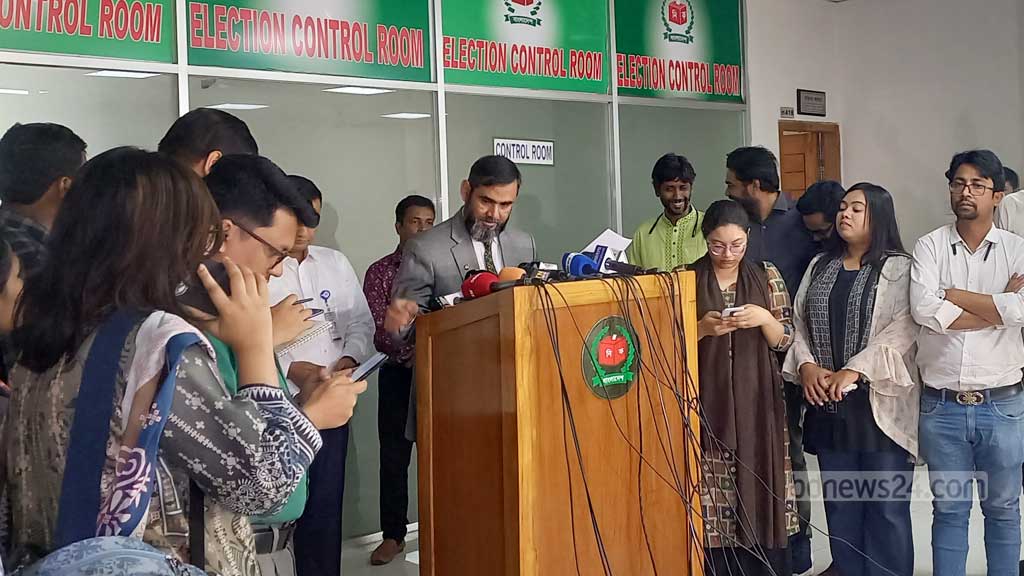Home
+

Published : 11 Mar 2025, 06:46 PM
The Election Commission, or EC, aims to introduce proxy voting on a limited scale for expatriate Bangladeshis if political parties and other stakeholders agree.
Election Commissioner Abul Fazal Md Sanaullah said in a press conference on Tuesday that expert opinions on proxy voting, one of three proposed methods, would be sought in early April.
A discussion with political parties and other stakeholders will follow.
“If all parties agree and the system can be developed, proxy voting will be introduced on a small scale in the 13th parliamentary election,” he added.
Alongside trials of postal and online voting, the EC Secretariat’s relevant committee has also recommended proxy voting for the next general election.
According to the Election Commission, this method will allow a person residing in Bangladesh to cast a vote on behalf of an expatriate in their respective constituency.
The committee overseeing the proposal highlighted identity verification and maintaining voter confidentiality as key considerations for proxy voting.
A presentation on the method was held on Monday, and the commission has approved a workshop on the topic.
The election commissioner said: "Proxy voting is the only method that can be implemented within a short timeframe.
“A workshop on the three methods will be held between the 7th and 8th of April.
“Experts from Dhaka University, [Bangladesh University of Engineering and Technology], [Military Institute of Science and Technology], the Electoral Reform Committee, and private institutions will be invited.”
He added that if an architecture for any of the three voting methods is developed within mid-April, the Election Commission will then hold discussions with stakeholders.
POSTAL BALLOT INEFFECTIVE
The election commissioner remarked that postal ballots were ineffective for expatriate Bangladeshis at the moment.
Sanaullah said, “Our committee’s findings show that postal ballots are not a viable option for expatriates at present. Once ballot papers are printed, there are only 10 to 12 days before voting.
“For expatriates, postal voting would take 24 to 40 days, which renders it ineffective. An alternative must be found.”
“In the last election, not a single expatriate vote was cast through this method. Only 433 postal votes were counted within the country,” he added.
WHY PROXY VOTING IS RECOMMENDED
A committee headed by Sanaullah is overseeing the issue, alongside another committee comprising officials from the EC Secretariat’s ICT and expatriate wings, tasked with recommending a voting method for overseas Bangladeshis.
The election commissioner said the committee had suggested trials for the first two methods—postal ballot and online voting.
After testing, they will determine which method is easier to implement.
“For the next election, if we genuinely want to meet expectations, as mentioned by the chief advisor, we must adopt proxy voting,” he added.
Sanaullah explained that the committee supports proxy voting because it's widely practised around the world.
He added that, similar to land transactions done through power of attorney, voting rights can be implemented in the same way.
“In Bangladesh, there is already a provision for voting with the help of another person, particularly for those with physical disabilities or visual impairments, where one person votes on behalf of another.
“The committee has recommended this as the most suitable method,” the official concluded.
HOW PROXY VOTING WILL WORK
Election Commission officials said expatriates who wish to vote through this method must first register via an app using facial recognition.
Through pre-registration, they will express their interest in voting.
At the time of registration, they must provide the NID and details of the person who will vote on their behalf.
Once registration is completed, the Election Commission will inform the voter of the timeline, specifying who will be casting proxy votes.
A separate voter list for proxy voters will not be necessary.
Abdul Momin Sarker, director (registration & expatriates wing) at National Identity Registration Wing, or NIDW, said: "The person who is designated as a proxy voter will cast the vote on behalf of the expatriate while also being able to cast their own vote. This is a form of power of attorney.
“Expatriates will register from abroad and designate someone from their electoral constituency as a proxy voter.”
“There will be an authentication process to ensure that the system is not misused,” he concluded.